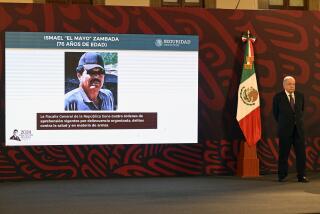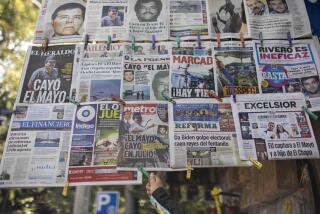Ex-Argentine General Is Held Without Bail
- Share via
SAN FRANCISCO — In federal court on Monday, as a small group of Argentine emigres looked on, a balding, paunchy and mustachioed man identified as former Gen. Carlos Guillermo Suarez Mason was ordered held without bail, pending extradition to Argentina.
Suarez Mason, said to be the most infamous Argentine military leader still untried for the disappearance of thousands of dissidents during the 1970s and ‘80s, was arrested on Saturday, after an intensive eight-day search that took U.S. agents from Long Island, N.Y., to the fashionable suburb of Foster City on the San Francisco Peninsula.
He is accused of being commandant of the military region encompassing the province of Buenos Aires from 1976 to 1978, when hundreds of dissidents were kidnaped, tortured and killed in the military’s so-called “dirty war” against suspected Marxist subversives.
Brooklyn Warrant
The “dirty war” refers to the military junta’s campaign against suspected Marxists during its reign, which ended in 1984. The civilian government of President Raul Alfonsin has documented 9,000 cases of people who disappeared and are presumed dead. Human rights activists believe that as many as 30,000 people disappeared during the military regime.
Suarez Mason later became head of the joint chiefs of staff and president of the state-run oil monopoly, but he has been a fugitive since 1984, when the civilian government ordered his arrest on charges of human rights violations.
Suarez Mason was held on a warrant issued by a federal court in Brooklyn, N.Y., charging him with false imprisonment and torture in connection with the arrest of an unspecified number of contractors and lawyers in late 1978. In Argentina, he has been charged with 177 specific crimes, mostly kidnaping. Argentine authorities also identified him as a leader of an effort to destabilize the Alfonsin government in October, 1985.
He was arrested on his 63rd birthday at his rented two-story home in Foster City, undone largely because of a Christmas visit to his son in Garden City, N.Y., and records of phone calls between him and his son.
Since coming to the United States in 1984 or 1985, he has described himself to acquaintances as a financier, according to Deputy Marshal Victor Oboyski, one of the New York investigators in the case. It was unclear whether Suarez Mason entered this country on a valid visa.
The events leading to his capture began in June, 1986, when Argentina, acting through Interpol, the international police agency, asked U.S. marshals to begin looking for Suarez Mason, Oboyski said. Interpol gave Long Island as a possible residence.
Agents found Suarez Mason living in a rented home about half a mile from his son in Garden City. Once he was found and Argentina was notified, the marshals awaited further instructions and kept him under periodic surveillance. During this time, Suarez Mason moved to Foster City, and agents lost track of him.
Then, in a Jan. 16 dispatch, USA Today reported that Suarez Mason was living in New York. “That set everything in motion,” Oboyski said in a telephone interview.
Agents, stepping up their efforts, began openly asking about Suarez Mason. From neighbors in Garden City, they learned that he had visited his son during the Christmas holidays, that he was a jogger and that he had mentioned last summer that he was moving west.
Deputies learned from phone records that there had been calls between his son’s home and a number in Foster City. Last Thursday, agents in Brooklyn contacted the San Francisco marshal’s office.
Knowing he is an avid jogger, agents were ready to arrest him outside his home on Saturday. But it was raining that day and Suarez Mason did not go outside.
Later in the day, agents finally knocked on his door and arrested him. Deputy U.S. Marshal Dennis Berry said he later asked Suarez Mason whether he knew why he had been arrested. “Yes, I do know why--for crimes against my people,” Berry quoted him as saying.
Shortly before he fled Argentina in 1984, Suarez Mason was quoted in Argentina as saying he was being made a scapegoat. “I’m not going to help this political carnival. Neither am I going to accept being tried by civilian judges,” he was quoted as saying in 1984.
After he appeared before U.S. Magistrate S. Steele Langford, Mason’s lawyer, John Philipsborn, said his client may not be the same person wanted by Argentina.
U.S. District Judge Lowell Jensen is scheduled to hold a hearing Wednesday during which identification and other matters related to the extradition will be decided. Argentina has 45 days to supply prosecutors here with information about his alleged crimes.
A subordinate of Suarez Mason, Brig. Gen. Ramon Camps, the former police chief of La Plata, the capital of the Buenos Aires province and location of the main prison, was sentenced recently to life in prison for similar human rights violations.
Suarez Mason’s arrest and appearance in court brought back particularly painful memories to a small group of former Argentine union activists who attended the hearing. “He just refused to release me,” said Horacio Martinez Baca, a labor lawyer who was jailed from 1977 until 1980 without charges. “Life and death was in his hands.”
More to Read
Sign up for Essential California
The most important California stories and recommendations in your inbox every morning.
You may occasionally receive promotional content from the Los Angeles Times.













